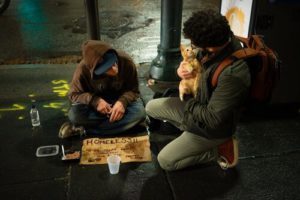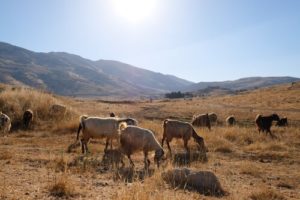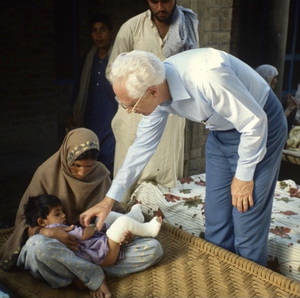THE HEART OF GOD…THE REAL GOSPEL
March 24, 2021 2024-05-10 13:07THE HEART OF GOD…THE REAL GOSPEL
The following is transcribed from “Our Anemic Gospel” podcast by Scott Booth, published June 7, 2017
In our Narrative class the students came to me with this question, “Luke seems to be pretty competent at storytelling in the first two chapters and at the end of Luke. The part where he’s telling us about the birth, death, and resurrection of Jesus. However, everything in between makes no sense. Why does Luke do this? It’s like a director that has the ability to direct a normal movie and then throws random stuff in the middle.” So I asked the students to pick the strangest part of the middle and let’s talk about it. They chose Luke 14.

Luke 14:
14 One Sabbath, when Jesus went to eat in the house of a prominent Pharisee, he was being carefully watched. 2 There in front of him was a man suffering from abnormal swelling of his body. 3 Jesus asked the Pharisees and experts in the law, “Is it lawful to heal on the Sabbath or not?” 4 But they remained silent. So taking hold of the man, he healed him and sent him on his way. 5 Then he asked them, “If one of you has a child[a] or an ox that falls into a well on the Sabbath day, will you not immediately pull it out?” 6 And they had nothing to say. 7 When he noticed how the guests picked the places of honor at the table, he told them this parable: 8 “When someone invites you to a wedding feast, do not take the place of honor, for a person more distinguished than you may have been invited. 9 If so, the host who invited both of you will come and say to you, ‘Give this person your seat.’ Then, humiliated, you will have to take the least important place. 10 But when you are invited, take the lowest place, so that when your host comes, he will say to you, ‘Friend, move up to a better place.’ Then you will be honored in the presence of all the other guests. 11 For all those who exalt themselves will be humbled, and those who humble themselves will be exalted.” 12 Then Jesus said to his host, “When you give a luncheon or dinner, do not invite your friends, your brothers or sisters, your relatives, or your rich neighbors; if you do, they may invite you back and so you will be repaid. 13 But when you give a banquet, invite the poor, the crippled, the lame, the blind, 14 and you will be blessed. Although they cannot repay you, you will be repaid at the resurrection of the righteous.” 15 When one of those at the table with him heard this, he said to Jesus, “Blessed is the one who will eat at the feast in the kingdom of God.” 16 Jesus replied: “A certain man was preparing a great banquet and invited many guests. 17 At the time of the banquet he sent his servant to tell those who had been invited, ‘Come, for everything is now ready.’ 18 “But they all alike began to make excuses. The first said, ‘I have just bought a field, and I must go and see it. Please excuse me.’ 19 “Another said, ‘I have just bought five yoke of oxen, and I’m on my way to try them out. Please excuse me.’ 20 “Still another said, ‘I just got married, so I can’t come.’ 21 “The servant came back and reported this to his master. Then the owner of the house became angry and ordered his servant, ‘Go out quickly into the streets and alleys of the town and bring in the poor, the crippled, the blind and the lame.’ 22 “‘Sir,’ the servant said, ‘what you ordered has been done, but there is still room.’ 23 “Then the master told his servant, ‘Go out to the roads and country lanes and compel them to come in, so that my house will be full. 24 I tell you, not one of those who were invited will get a taste of my banquet.’”
Some of those parables are not hard to understand. The difficulty here is the linkages; like the one with the wedding feast. You’re invited and you sit right next to the bridegroom and he’s like, “buddy that’s not your seat” (that’s so embarrassing). That’s not a hard parable to understand. The difficulty comes as to why he says this after an ox law and after healing a guy who has swelling all over his body. So that’s what we want to work on.
 At the beginning of the story we have this guy who is suffering and Jesus poses the question,
At the beginning of the story we have this guy who is suffering and Jesus poses the question,
‘Can I heal this guy or not?’ and no one has anything to say. This is similar to chapter 13 as well. Jesus responds here because no one answers him no one knows what to say on this so he answers in this way: “If one of you has an ox and it falls into a pit, wouldn’t you get it out?” My question is, “What does a guy with an ox have to do with a man with swelling?” You’re right to point out that in Luke 13 there’s a similar question on the Sabbath. Jesus was teaching in the synagogue and a woman was there who had been crippled by a spirit for 18 years and was bent over and couldn’t straighten up at all. When Jesus saw her, he said to her, “Woman, you are free from your infirmity” and he put his hands on her and she was immediately healed. The teachers of the Synagogue were indignant because Jesus healed on the Sabbath. The teacher of the Synagogue said to the people, “There are six days for work so come and be healed on those days, not on the Sabbath.” The Lord answered him, “You hypocrites! Doesn’t each of you, on the Sabbath, untie your ox or donkey from the stall and lead it out to give it water? Then should not this woman, a daughter of Abraham, who Satan has kept bound for 18 years be set free on the Sabbath day from what has bound her?” This all goes back to some of the Torah stuff we have done in the past Podcast episodes. This one goes back to the ox law. An ox laws is not about an ox. You guys set your ox and donkey free on the Sabbath but, here Is a bound human being and you guys aren’t sure if I can set this him free? How utterly confused can you be? This is a person that’s hurting! So let’s go back to Luke 14, Jesus is sitting there at this party with prominent people who know the law and he says ‘Can I not heal this person on the Sabbath?’ And they don’t know. So, Jesus says, “look if one of you had a kid or an ox that fell into a pit you would pull out that ox and you’re looking at this person suffering and you don’t know how to answer the question?” So, that’s why he brings up the ox law. How much more should you do it for a person? Then he launches into the wedding feast. And the question is, what does the wedding feast have to do with anything? And the answer to the wedding feast is: don’t put yourself in a place of honor so that you don’t get humiliated. But what does that have to do with the circumstance? This is the big question. Why does Jesus use this parable here? Why is It appropriate that Jesus brings out the parable of the wedding feast at the time where he’s talking about healing? Remember the audience that Jesus is working with. He’s working with Pharisees and experts in the law. Jesus is essentially saying, “Oh, you guys sat in the front of the table. You thought you understood the law, but you don’t know if I could heal on the Sabbath? Get to the back of the room.” He’s calling out those who know. Remember the original Sabbath story- The manna Sabbath. In the manna Sabbath, people are hungry and God feeds them. So basically, every day they collect food for themselves but, once a week they get to collect twice as much so that they don’t have to go out and can rest on the seventh day. It is to provide rest. So Jesus, looking at this guy’s swelling was asking, “Can I heal him or not?” And they will say ‘no’ because it could offend God to do work and to set that man free to give him rest on the Sabbath day. I would rather do work to set that man free so he can rest than I rest and watch him labor under his burdens.” That’s the kingdom. So that’s why, at the end, he says, “ those who exalt themselves will be humbled and those who humble themselves will, at the end, be lifted up.” So these Pharisees who, by reflex, do not know that the God who helped them in the desert wants to help that man. God so helped us, help that man! Instead they’re encumbered by the technicality of what they understand to be the law.
So, then we move to the next one. In the next one, Jesus turns and looks at the guy who started the feast and he says, “Oh buddy, this is useless. What you should’ve done is invite the poor.”

And the question is, what does that have to do with the previous parable? And what does that have to do with the ox law? What does that have to do with healing the man on the Sabbath? It’s all the same principle. The low will be made high. The high will be made low. Jesus said, “look, you had a shot at helping the poor, crippled, lame, and blind. You could’ve helped them . You could have given a poor person a day where they didn’t have to worry about dinner . You could’ve made them feel like a king for a day. You could’ve done that. But you didn’t. Instead, you did something that you could get paid back for. This is useless. This should cost you. You should rather lose so that you can take someone and give them relief for a day. Then the ‘kiss up’ student pipes in and says, ”blessed are those who will eat at the feast of the kingdom of God!” You have to remember here that all the things Jesus is doing here with feast stuff is Kingdom of God stuff. It’s -’who will be accepted into the kingdom of God?’ So Jesus replies, “alright guys, look there’s a guy who invited everybody to the feast. When it came time for the feast, they all had a reason not to come. So then he extends the invitation to those who have not been previously invited. To this other group- the lowly.” So why did Jesus tell this parable? And what does this one have to do with the last parable? And what does this one have to do with the ox law? And what does that have to do with the abnormal swelling? In this one, he’s essentially saying, “you guys are all rejecting this. We invited you, and now the time has come. Here I am, giving you the kingdom of God. I can heal this man, and you don’t know what the answer is…” in the first parable he says “get to the back of the bus, and in this last parable , he says get off the bus.” Because he ends with “ I tell you not one of those who were invited will get to taste a thing. “ Guys, you aren’t getting anything. You think you know the law, but you can’t tell me if I can help a person?
So the question is, is it lawful for Jesus to heal this man? Was it a violation of Sabbath? They don’t understand. This whole thing is about helping and fixing and turning it upside down. The whole Sabbath with manna was about giving them a day of rest. We must remember that this ‘rest’ wasn’t just from the task of collecting food, it was ‘rest’ from the thought process of ‘Am I going to have food tomorrow? How am I going to feed my family tomorrow?’ They could go to bed, one night a week, knowing already that they have food ready for the next day. It’s so compassionate. Compassion is the foundation of this. And these experts in the law don’t get it.

A couple points to wrap this up. This middle section of Luke can feel like it’s randomly connected, but when you really work hard, at least on individual chunks, you start to see that there’s a message here. In the first half of Luke 14, you see that these teachers and experts in the law don’t understand the basic principles of God’s heart.
So now, let’s go back and ask our original question- now that we’ve got some kind of hold on Luke 14. Why is it that Luke can tell a good story in the beginning of his book then go into captain random thought- which seems to be just disjunctive stories or vignettes stuck together- and then go back into storytelling at Luke 22 when we get to the death and resurrection of Jesus? What is going on here? I think we are forced into the position that the gospel is not the death and resurrection of Jesus. Because, if the gospel was the death and resurrection of Jesus, you have no need for this middle section. If the storytelling bits of Luke are the birth, and leading up to the ministry of Jesus, and the death and resurrection of Jesus, why take all the time to put these stories together in such an odd way in the middle? Great question. I think the answer is that the gospel is bound up in the teachings of Christ. The things he did when he was living. I actually think that part of the reason that we have this anemic gospel that just says that Jesus came to die for your sins is because this middle section is hard. And actually because we are more pharisaic. We don’t actually get the heart of God. Part of it is that we are sitting there listening to the teachings of Jesus (like these Pharisees) and we’re astounded- a little dumbfounded- but we don’t know what to say. We don’t know what to do with it. We don’t get it. But, if we take the time to really work through it, we see what Jesus is concerned about. He sees people hurting and he wants to help them. It’s that easy. The kingdom of God is here and it has an impact now. That’s what he’s saying to them especially. That last parable. when I read where he says, ‘you were invited and you didn’t show up because you had other stuff to do. That tells me that the kingdom’s happening right now. So, what you start learning through the teachings of Jesus is that he’s just utterly concerned with people who need to be rescued. The first time we hear that the death and resurrection isn’t the gospel, our immediate impulse is that we’re minimizing the death and resurrection of Jesus Christ…but we’re not. We’re pointing to the death and resurrection as the high point of this reversal of fortune’s. But, if you don’t understand the reversal of fortune stuff, then you don’t really understand our role in the kingdom. What were supposed to be about here and now. We really cripple our churches because our church is a full of people who think they have no real part in the kingdom of God or in the gospel when, in fact, by virtue of being a Christ follower (having the Spirit dwell in them and they invite the Lord to have sovereignty over their decisions or what they’re doing or in their conversations – all that kind of stuff) when their eyes are open to how they can help lift people up. How they can be day in and day out participants in the gospel of the kingdom of God. I continue to be shocked and amazed at how few people understand that. What if you have a gospel that says Jesus came and died for you. Yes, that’s the pinnacle but, the principal there is because he sees you hurting, and he sees that you need healing (even on the Sabbath or whatever day) and he’s going to do it. So then you, as a citizen of the kingdom, you are to mimic the behavior of your king. If you see someone hurting, you launch. How could you for a minute wonder if you can help? How could you wonder that?
So you picture Jesus back at this feast with these experts in Torah, and he says, ‘can I heal this person?’ and they don’t know what to say!? How do you not know what to say!? Jesus is saying, ‘of course I can heal him! Look at him! He’s hurting! Guys? And if I say no to him, then you’ve got to be willing for me to say no to you. That’s the same idea. Do you want me to go out be that kind of God to you? The one that says no? Well then that’s what you’re going to get. You need to be part of my kingdom. My kingdom comes and helps. My kingdom comes and heals. My kingdom comes and flips things upside down. My kingdom’s right here. Are you in or are you out? And the fact that you’re sitting there wondering if I can help says you’re out. I have nothing to do with this.’
So that’s why there’s a middle section of Luke. Because that’s the gospel.
And so then, the death and resurrection of Jesus becomes this clarifying, super moment.
of that very thing happening. In that middle part of luke, you’re getting a window to the straight line view of the gospel that people had waited millennia for. Read through it, it’s fantastic. You’ll get the heart of God in it.
Related Posts
The New Testament in Color
Exploring Revelation with Dr. Dan Morrison
Kingship in the Psalms with Dr. Beth Currier
Search
Popular Tags




